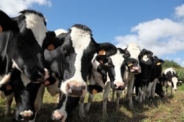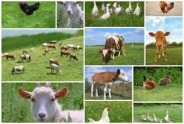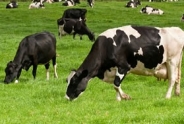Communicating for Safety
Libby Eiholzer, Bilingual Dairy
Northwest New York Dairy, Livestock & Field Crops
Communicating for Safety
There are many risks inherent in working on a dairy farm. People, animals, trucks, tractors, mixer wagons and manure spreaders are among the host of moving objects that create potentially hazardous situations. It?s really a wonder that more accidents don?t take place on dairy farms! Even if your farm has never been subject to an accident, it?s a good idea to take into consideration some preventative measures to keep everyone - human and bovine - safe on your dairy every day.
Dairy farm employees from rural Mexico or Guatemala have often never operated machinery before. Many things that people who have grown up on a tractor seat take for granted as common sense can be very foreign to them. For example, what speed is acceptable in different areas of the farm? What hidden dangers are associated with driving a skid steer near manure storage? When training new employees to operate machinery, take time within the first few days to review important safety basics.
So what are the most important things for these employees to know as they learn to operate machinery? Something I've heard time and time again from managers is that they need to know when something breaks in order to fix it. All too often they find out the tractor has a flat tire when they need to use it; if their employees had let them know when it happened, then they could have made time to fix it and avoided frustration. Besides being a communication issue, broken machinery and installations can pose a threat on the farm to people and animals, especially when passersby are unaware of them. Managers, in turn, need to place a high priority on repairs so employees will continue to communicate. It's also important for managers to show their employees their appreciation for speaking up; nobody likes admitting they have broken something, so making the experience as painless as possible encourages them to come communicate these problems in the future.
Managers? expectations for what maintenance machinery operators will perform on equipment varies from farm to farm, so the best thing to do is make those expectations very clear. Managers need to be very explicit about what needs to be done and why, as it may not be something that the employee has ever done before (check oil, grease, wash, fill with gas). Gas and diesel tanks should be clearly marked, and any necessary tools kept somewhere where they can be found.
A good way to increase everyone?s awareness of safety issues is to offer farm safety training to your employees. In many states NIOSH Agricultural Safety and Health Centers offer free safety trainings, sometimes in Spanish and English. Visit their website to see if trainings are available in your area: (http://www.cdc.gov/niosh/agctrhom.html).
*Amended from an article that appeared in the May 2013 issue of El Lechero.
Upcoming Events
2026 Soybean & Small Grains Congress
February 11, 2026
Henrietta, NY
Participant Registration for the 2026 Soybean & Small Grains Congress NOW OPEN!
2026 Forage Congress
March 12, 2026
Nunda, NY
Due to the unprecedented winter storm that recently impacted travel conditions across the region and U.S., combined with extreme cold temperatures and associated safety concerns, Forage Congress was postponed out of an abundance of caution. This decision was made with the safety of our participants, speakers, staff, and venue partners as the highest priority.
We are pleased to officially announce that Forage Congress has been rescheduled for Thursday, March 12, 2026, and will be held at The Nunda Ranch as originally planned.
Address: 2278-NY 436, Nunda, New York 14517
Sponsorship opportunities, vendor participation, and event registration are now open. We are excited to reconvene this important educational program and look forward to welcoming producers, industry partners, and speakers for a full day of applied, research-based forage systems programming.
From Dry to Fresh: Transition Cow Management Training
March 12, 2026
Albion, NY
This is a 1-day hands-on training in transition cow management offered in English and Spanish.





